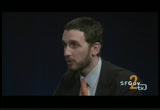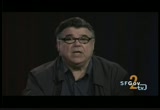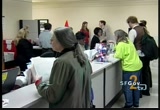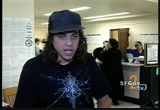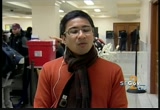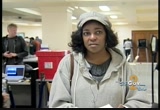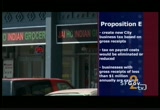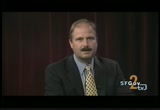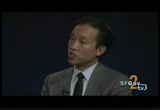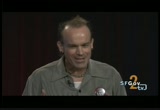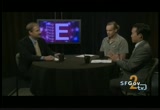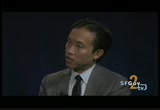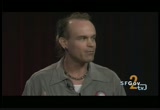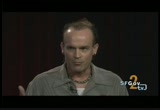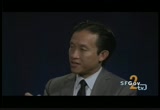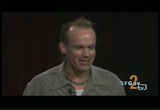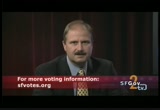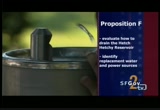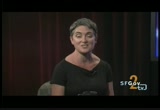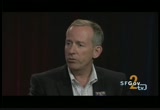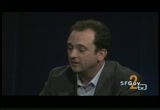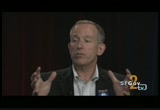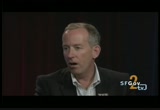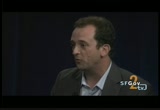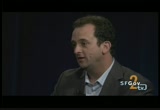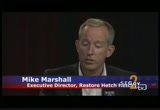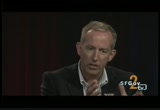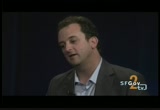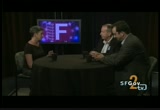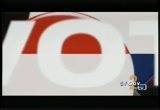tv [untitled] October 9, 2012 5:30pm-6:00pm PDT
5:30 pm
mean more people voting for city attorney and treasurer and if that's not democracy, i don't know what is. there's a reason why this is getting such broad support and i think it deserves the voters' support. >> thank you. and dr. faulkner, would you please summarize why you believe people should be voting against this measure? >> originally it was all odd year elections for city government. the main focus was to have a lot of elections spread out so people would pay attention. that was the idea of the 1932 charter. it is good in the sense given the history of san francisco and, frankly, a lot of governmental problems we had historically, getting people to pay attention to city government has been very important. we had 1901 to 1907 a group called roof ring, they described the 18 supervisors then on the board as, quote, so corrupt they would eat the paint off the walls. that's the reason why we want people
5:31 pm
to pay attention to their city government. frankly, new england city governments are the small ones and tall hall government is the best of all. we can't do that. but we can give people is exposure to city government, it avoids a lot of problems. we have had a lot of mistakes. (inaudible) was not built when they put in the underground, that caused umpty million dollars to correct. >> we hope this discussion was informative. for more information on this and other ballot measures in this year's election, please visit the san francisco league of women voters at sfvotes.org. remember, early voting is available at city hall monday through friday from 8:00 am to
5:35 pm
5:36 pm
discuss proposition e the city requires businesses it pay a flat 1.5 percent tax on payroll cost for work performed in the city. small businesses with less than 250,000 dollars in payroll costs are exempt from the tax. proposition e would create a new city business tax based on gross receipts rather than payroll costs. under the new system, the tax on payroll cost would be eliminated or reduced. businesses with gross receipts of less than 1 million dollars annually will be exempt from the gross receipts tax. the gross receipts tax rate would vary depending on the type of business and its annual gross receipts from its activity in the city. certain businesses that have their headquarters or administrative offices in san francisco that operate primarily in other locations would pay the gross receipts tax based on payroll costs. proposition e would require the city to phase in the gross
5:37 pm
receipts tax and phase out the tax on payroll costs over a 5 year period beginning in 2014. if the gross receipts tax revenue exceeds the revenue the city would have received under the tax on the payroll costs, then the tax on the payroll costs will be phased out and the final gross receipts tax rate will be lower than the maximum submitted in this measure. i'm here with board of supervisors president david chu, and also joining us is starchild and former candidate for public office and opponent of the office. supervisor chiu, please explain why we should be voting for this proposition. >> so proposition e is a measure it reform our current business tax. over a decade ago, a lawsuit forced our city to use a business tax that is problematic for many reasons. first and foremost, it is a tax on jobs. every time a local
5:38 pm
employer hires someone there is a business payroll tax that's levied on that person. secondly, it is a tax that is only levied on 10 percent of all businesses and many of these are small businesses who have really been asking for reform for many many years. currently we are the only city in the state of california that uses this business payroll tax. our city government, we spent 6 months earlier this year in conversations with many leaders within the community to propose a change to a so-called gross receipts tax, which is superior on a number of levels. first and foremost, it's a tax on revenue. it's a tax on profit. it's also a progressive tax, unlike the current flat tax it's a tax that exempts small businesses that have revenues of less than a million dollars but it also increases taxes for our most successful and our largest businesses. then the last thing i will mention, it is a tax that will help to recoup the revenues that we lost 10 years ago to make sure we have money for
5:39 pm
affordable housing, for muni, public safetying and public health . >> starchild, why do you think we should vote against this proposition? >> i agree with everything supervisor chiu said about payroll tax. if this measure were revenue neutral, if it were substituting a gross receipts tax for a tax on payroll, the libertarian party would have supported it. but unfortunately some people at city hall got greedy and so the measure is actually a 25.8 million dollars a year tax increase. during a recetion, people are suffering, many people unemployed, many people in san francisco are earning minimum wage, thousands of course on our streets. it's the wrong time to be raising taxes on businesses because the largest employers, of course, have the largest number of jobs
5:40 pm
and you incentivize those employers to go away and we're going to lose jobs. >> supervisor, from reading the material on the proposition it appears it will increase the number of businesses you will be taxing from 7500 to 15,000. doplt you think that's increasing the tax on the companies within the city? >> a couple things of note. our current business payroll tax is only applied to 10 percent of all businesses and that means these businesses are shouldering the burden for the entire business community of city services that the private sector receives. the business community has recognized for years that this is unfair and so what we've been trying to do is to spread these expenses more evenly across the business sector, going from 10 percent of all businesses to 20 percent of all businesses.
5:41 pm
and i think the other thing that's worth noting is 10 years ago when this lawsuit hit our city which forced us into the tax that we have now, this unfair tax, we lost about $30 million dollars of revenue. so what we're trying to do right now is make up that revenue. in recent years every single year i have been in office we have had to balance massive budget deficits. in fact, my first couple years we had half billion dollar budget deficits we were trying to eliminate from our budget. the thought of not only bringing back 30 million that we lost a couple years ago, it's only a small amount compared to what we have had to cut the last couple years and i think everyone has seen the impact of not having enough money for muni, having to close down services vital to our city, not having money to build affordable housing for our police officers, our fire fighters, our nurses, our public health system, i think we all see the benefit of that. >> starchild, you made a
5:42 pm
comment earlier that you agreed with the supervisor with the exception of the registration fee for all the businesses. is that the only issue that you disagree with or are there other issues that you disagree with? >> that's the only issue. the issue is that we shouldn't be transferring more money from the people of san francisco to the government of san francisco. government has grown so much in recent years and now we're in the middle of an economic downturn when people are hurting. thousands of individual san franciscoans, businesses, have had their budgets cut. they have lost jobs over the past decade. they have lost more revenue than the 30 million city hall has because city hall has taken more than that amount from the people and businesses of san francisco. unfortunately it's complicated to try to get them to tell their individual stories, it dosment tell about all the individual families and people that have had their budgets cut. any measure that takes more money from the
5:43 pm
people is a bad thing. this particular measure, it recognizes that going after the smallest employers is bad, you know, but most businesses in san francisco are small employers and why penalize them for growing and being successful? you know, if they start to get more -- i disagree that it's tax on profits because gross receipts is not necessarily profits, profits is a you earn after your expenses, gross receipts, it's what you earn before your expenses. somebody could learn a lot of money on paper and after their expenses they could lose money as a company but still have it pay this tax. >> supervisor, what would you like to say in closing? >> well, i think it's important to note that this was a measure that was worked on really by the people of san francisco. so it's a measure that's not only supported unanimously by the board of supervisors and by our mayor, but it was agreed upon with the
5:44 pm
business community as well as the entire labor community, the democratic party has endorsed it as well as the republican party. advocates for our homeless and public health system as well as our police and fire fighters and folks that want to build more affordable housing, there really is support for this across the spectrum. and i do think it's also worth noting that this measure, while it will bring a little bit more tax revenue, is also projected to bring in on average about 1700 new jobs a year when it is implemented. and the reason for that is rather than taxing jobs, we are taxing revenue. and we have targeted for different industries based on the levels of revenues that they get. some industries have high gross revenues but low profits and we have lower gross receipts rates for them, so the idea that somehow those industries might be targeted, we spent a lot of time with many leaders in the business community including and
5:45 pm
particularly small business advocates around the city to make sure this was carefully crafted. so i really do hope voters will support this consensus measure with proposition e because it's good measure for jobs, it's a good measure for our city, it's a good measure to make sure san francisco continues to inknow 78 and continue to employ all san franciscoans. >> starchild, how would you like to conclude? >> again, when you hear bi-partisan compromise at city hall, hold on to your walts as the saying goes. obviously the libertarian party didn't have a seat at the table and i don't feel like tax opponents in general -- proponents of people keeping more of their money they earn really had a seat at the table with this. mayor lee's initial proposal wasn't bad. he wanted to make it revenue neutral but the measure got modified through the back door dealing, things got changed and we round up with a revenue non-neutral measure.
5:46 pm
again, payroll tax is bad. i'm all for getting rid of it. everything else being equal, i'm sure it would result in more jobs but we'd rather see something fair across the board that didn't take more money from the people and, you know, few teer tax breaks to favored companies like twitter and so forth, just a strict revenue neutral approach across the board for everyone. >> thank you for your time. we hope this discussion was informative. for more information on this and other ballot measures in this election please visit the league of women voters at sfvotes.org. remember, early voting is available monday through friday at city hall from 8:00 am to 5:00 pm if you
5:47 pm
hi, i'm jay coenig, a member of the league of women voters. along with the league and sfgovtv, i'm here to discuss proposition f, a ballot measure that will be before the voters on november 6. san francisco owns the hetch hetchy regional water system which provides water to about 2.5 million people in san francisco and neighboring areas. proposition f would require the city to prepare a two-phase plan to evaluate how to drain the hetch hetchy reservoir and identify replacement water and power sources. the first phase would identify new water supply and storage options, additional water conservation opportunities, expanded water filtration facilities, and additional renewable energy sources. the second phase would evaluate how to drain the hetch hetchy valley and stop using it as a
5:48 pm
reservoir so it can be restored by the national park service, increase flows on the lower tuolome river and decrease storm water discharge into the bay and the ocean. proposition f would allocate 8 million dollars to pay for the plan and create a 5-member task fers to develop it. i'm here with mike marshal, the executive director of restore hetch hetchy and a proponent of proposition f we're also joined by district 7 supervisor, sean he elsbernd, representing the save hetch hetchy no on f campaign. gentlemen, thanks so much for taking the time to be with us today. >> thank you. >> mike, i'd like to give you the opportunity to make a brief statement of your work on the proposition. >> wonderful, thank you. proposition f is about san francisco's values, it's about their environmental values. in
5:49 pm
real short explanation, it requires the city to develop a plan for the future to guarantee our water security and begin to undo the damage that our current water system does to the environment. the plan would then be brought back to the voters in 2016 for their aprafl or disapproval so it's placing the city on a trajectory we're not currently on. we don't recycle any water, we've abandoned most ground water since hetch hetchy became available and we've done real damage to the tuolome river and we begin it's time to get in line with the city's values. it's a plan the voters ultimately get to approve. >> i disagree. i think proposition f is about one thing and one thing only, about forcing the city to spend $8 million dollars to conduct a plan that would require us to
5:50 pm
drain hetch hetchy reservoir at a cost of anywhere between 3 and 10 billion dollars that gets translated to our rate payers at anywhere between $2,000 and $2700 per year per rate payer. this is a proposal largely hoisted upon san franciscoans by outsiders. not one san francisco organization supports this measure. every group from san francisco tomorrow to the republican party across the political spectrum opposes us wasting this money, particularly because it is a plan that has been conducted at least 7 times over the last many decades and each time we've been told it is a colossal failure and not one we should pursue. >> mike, this gives you an opportunity to tell us why this time would be different. >> what sean is describing is not what's in the initiative. it's just a planning process. yes, our goal is to bring the
5:51 pm
hetch hetchy valley and yosemite back to life. san francisco is the only city allowed to park its water in a national park. a hundred years we made that decision and bee think every hundred years san francisco should revisit that decision. there's no down side to that. but you can't do that without also reforming our 19th century water system. it was designed in the 19th century and as a result it's very damaging to the environment. what we do is look at how do we consolidate from 9 reservoirs into 8 and begin to build our local water resources to offset a small percentage of water loss that might happen. let's figure that out. let's not have a conversation based on hypobole, in terms of sean saying there are 7 reports saying it's not feasible, that's not true.
5:52 pm
what's unfortunate about all those is the city of san francisco has boycotted participating in those studies. san francisco says, wait a minute we have a unique responsibility here. we're the only city that stores our water in a national park so let's see how we can do better because we don't do a very good job. orange county recycles 30 million gallons of water a day, we recycle zero. we have a great opportunity to guarantee our water future and undo the damage to yosemite national park. >> sean, one point i know is the hydroelectric power generated by that dam, if i remember it's 41 million dollars? do i have my numbers right? >> there are a number of reasons why hetch hetchy is such a benefit to the city, not
5:53 pm
the least of which is that it produces carbon free public power to the city of san francisco. one of my favorite lines mike just used is this measure is about consolidating from 8 reservoirs to 7. another way to say that is to say this is about draining one of them, the hetch hetchy valley. have other studies said this is feasible? sure, just like tearing down city hall or knocking down the golden gate bridge, that's possible but not feasible. we're not going to spend 3 billion dollars to tear down the hetch hetchy dam. let's not forget, we are also stewards for two dozen cities in the peninsula. over 2 million californians benefit from the foresight of our forefathers almost 100 years ago in building hetch hetchy. while the rest of the state is tying themselves up in knots
5:54 pm
trying to figure out where to get their water. not only did we have the type of water storage hetch hetchy provides, not only today but in the future, we are in a solid place. and to spend this kind of money, and let's just talk about the $8 million dollars, i think that's one thing we can agree on. this calls for us to spend $8 million dollars. in my own district, out at like merced, we're taking that amount of money and building a water recycling plant. mike wants us to take that money and waste it on a report. why would we want to spend money to redo what's already been done? >> i upd. that does bring up an interesting point as well with the infrastructure that was voted on and is almost complete. can you address that investment that's already been
5:55 pm
made. >> absolutely. >> and also with the state of california's report suggesting that 8 million wouldn't be enough to get a plan done. so if you could just address those two points that have come up. >> sure, let me start -- again, go to the report it says again 7 million is what's needed for san francisco to engage in the planning process. the larger amount is if we bring in the park service and the state of california, which at this point we don't need to do, we just need the san francisco public utilities commission to get off their butts and start to think about the future more effectively. this really boils down it a 21st century versus the 20th century view of water. sean says our future is secure. it isn't. anyone who thinks our future water supply is going to be coming from the tuolome river is crazy. the one thing
5:56 pm
we know about climate change is we have to change our water sources. again, we don't recycle any water. we're going to start importing water from daly city next week. we have some plans on the books to do 4 million gals by 2035. that's a fraction. the san francisco business times recbltly said san francisco's plans for the future are baby steps and it's disgraceful. prop f is about getting us away from that vision and getting us to plan for the future. >> sean, as a wrap up, the dollars that we're talking about here, whether it's a values debate, that's one thing, that's some of the language that i respect. but when i look at the dollars, i'm not sure, could you dra*e address how that the city and the controller's report? it seems to be a fairly vast effect.
5:57 pm
>> there's no question, this is a significant impact on the city but let's translate that for our viewers. it's an impact on the rate payers. this is not born by the city's budget, it's borne by everybody's monthly water bill. we know everybody's water bill is going to climb because we have to rebuild our sewer system. on top of that do we want to add many hundreds or perhaps thousands of dollars to conduct a rate study that has been done several times that is going to completely drain the stoerplg capacity we have and absolutely put the city further back tomorrow than where we are today? >> we're talking about lettinging the rate payers decide for themselves. it gives the rate payers the information they need in 2016 if it gets back on the ballot.
5:58 pm
the controller's report is actually quite inaccurate. it projects if prop f passes, a plan is implemented, adopted by the voters and hetch hetchy valley is restored that it will cost $10 billion dollars. that's not what people are voting on here. they are voting on prop f which is simply an $8 million dollar planning process. it's not just an $8 million planning process, it's voting for san francisco's future and i urge people to go to restoreyosemite.org and read about it. >> this is a measure hoisted on san francisco by outsiders. every san francisco political group across the political spectrum opposes this measure. this will cost us billions of dollars and it's an unnecessary complete waste of our rate payer dollars. we've done the studies, we know it's a waste, let's move forward with what
5:59 pm
we're already doing which are significant recycled water projects across the city. >> thank you, gentlemen. we hope this discussion was informative. for more discussion on this and other ballot measures in this year's election, please visit the san francisco league of women voters web site at sfvotes.org. remember, early voting is available at city hall from 8:00 am to 5:00 pm if you
99 Views
IN COLLECTIONS
SFGTV2: San Francisco Government Television Television Archive
Television Archive  Television Archive News Search Service
Television Archive News Search Service 
Uploaded by TV Archive on

 Live Music Archive
Live Music Archive Librivox Free Audio
Librivox Free Audio Metropolitan Museum
Metropolitan Museum Cleveland Museum of Art
Cleveland Museum of Art Internet Arcade
Internet Arcade Console Living Room
Console Living Room Books to Borrow
Books to Borrow Open Library
Open Library TV News
TV News Understanding 9/11
Understanding 9/11